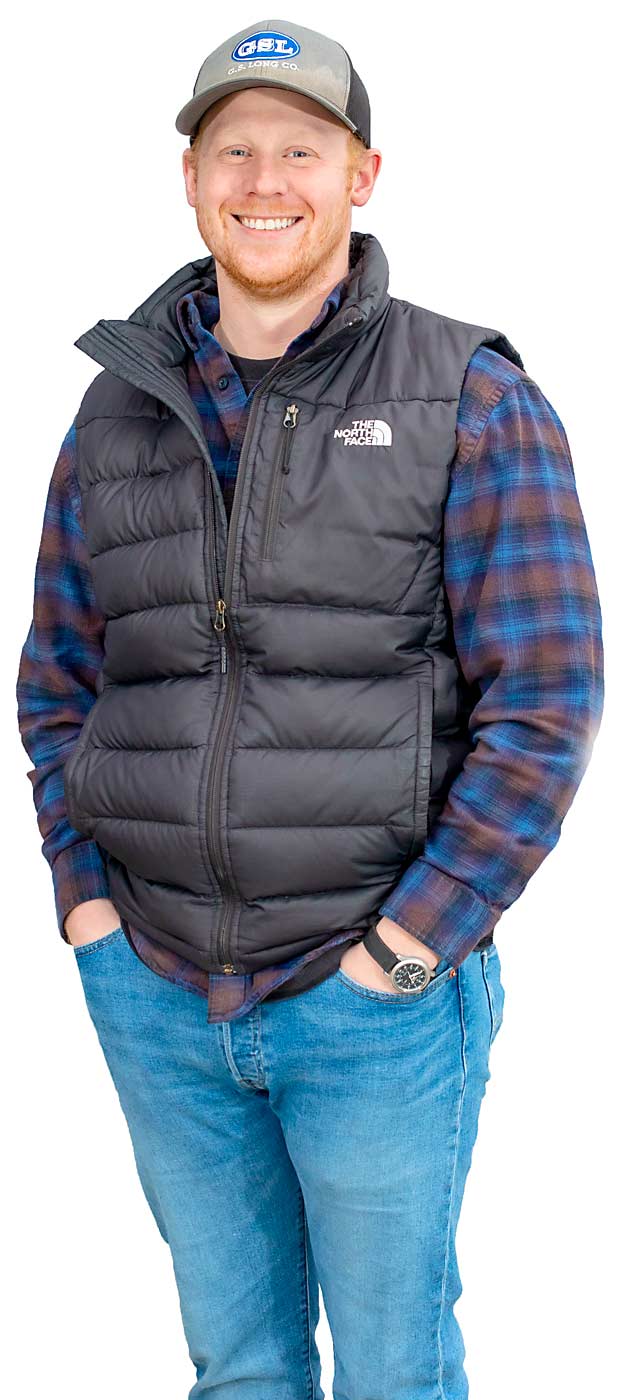family background/ Riley is a first-generation grower who obtained a degree in integrated plant sciences with a specialization in viticulture and enology from Washington State University. He is the vineyard manager of Elephant Mountain Vineyards and the son of Linda Hodge and Tom Miller.
age/30
grower/Yakima Valley, Washington
crops/Grapes
business/Elephant Mountain Vineyards
How did you get your start?
I grew up in Olympia, Washington, which isn’t a big ag town, and I had a normal kid life. I decided to go to WSU to study architecture, and during that time I realized I did not want to be at a desk my whole life under artificial lights.
I was able to find my way out of that into plant studies — not as a researcher though, because I wanted to be in the field.
I stumbled my way into viticulture and enology because wine is a bit more fun than potatoes.
Why did you go into winemaking?
When I was pursuing my schooling to become a winemaker, they require students to get an internship in the industry.
There was a local winery that I worked with that produced maybe a couple thousand cases. They needed help during harvest, so I and a couple classmates worked there.
It was filled with long, casual days that were fun, and I remember thinking how cool it would be to work in this industry.
What did you do after college?
After I finished school, I packed a bag and went to New Zealand and joined a company working on the wine side of things, working 25,000 tons of Sauvignon Blanc delivered in large trucks.
It was a big difference compared to working on that small Pullman, Washington, winery that I’d just interned at. Taking that jump was wicked fun and I made a lot of friends.
That experience cemented my opinion that I was in the right industry. After that I continued my travels, working at a California company that specialized in high-end Pinot Noir doing cellar work, back to New Zealand, then Australia and returning to the U.S. in Oregon’s Willamette Valley.
That whole time I was able to work with winemakers who always emphasized: We are shepherding great fruit into making great wine.
They taught me about building great collaborations between great vineyards and growers. When I returned from Australia and had my fun, I decided to make a career switch from winemaking to the vineyard side of the business.
What did you learn as a winemaker that’s helped you as a grower?
Every place I’ve worked has a high standard and an attention to detail in what they produce. I learned early on that the more attention you give to your work, the better the potential outcome.
Nothing will be perfect, but when problems arise you won’t be surprised because you’ve been watching things throughout the process. You’ll have an estimated guess of where things might go.
That is one set of skills that I learned in winemaking that’s been very important to me working in the vineyards. People say, “Oh you’re just a grower.
You add fertilizer, water and everything’s good.” But there’s a boots-on-the-ground attention to detail that’s ridiculously important to growing really high-quality grapes. It doesn’t matter if it’s a small vineyard or the big farms with thousands of acres — it all requires a high attention to detail to be successful.
For the people I worked for, attention to detail and striving for the highest quality possible was just their way of life. It didn’t matter if you were in the vineyard or winemaking; they were working to make the best wine humanly possible.
What would you tell young growers about the industry?
Working in the wine industry is not romantic. You don’t just sit around and drink wine. For instance, cellar work in my opinion is grueling, harvest is long, there’s 18-hour days, working on forklifts sometimes soaking wet, covered in earwigs and fruit flies.
Sure, there may be a romanticism to much of the work, but there’s no “sweater vests while drinking wine leaning on barrels” sorts of moments. This is very rewarding, hard work.
Another thing I’d tell younger growers is to go travel — get out in the world. Before this career I had never traveled. When I packed my backpack and flew to New Zealand, getting off the plane at 2 a.m., I remember thinking, “What am I doing here?”
It was so awesome and some of those people I worked with in my travels I continue to talk with all the time. It was a hugely rewarding experience to spend five to six months in another country working in my industry.
—TJ Mullinax







Leave A Comment